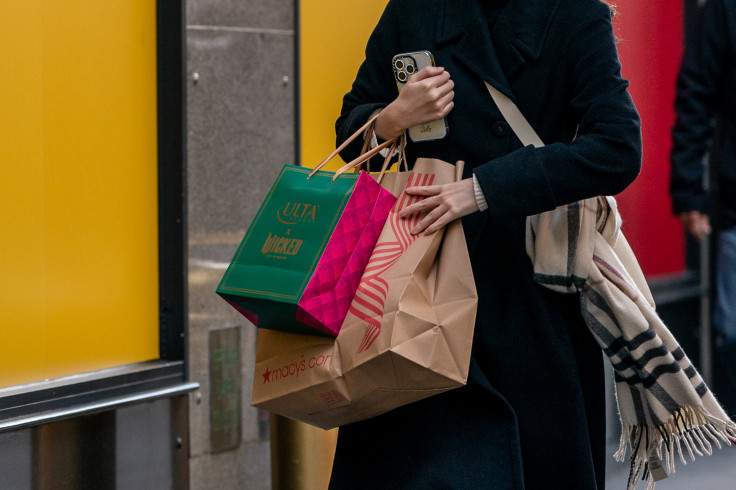Doom Spending On The Rise? Trump Tariff Fears Spark Buying Frenzy, Report Finds

One in five Americans are buying more items than usual, driven by concerns about President Donald Trump's tariffs, as fear of rising prices is fueling a rush to purchase and stockpile goods, according to a recent report from CreditCards.com.
According to the report, 19% of respondents said they are buying significantly more (5%) or slightly more (14%) items than usual. Of this group, 29% say fear of Trump's tariffs greatly impacts their desire to make additional purchases, while 37% say it's having some impact.
When asked about the influence of tariffs, 22% of respondents said Trump's planned tariffs influenced their spending habits, and 30% reported some effect. While 22% said the effect was minimal, 26% felt tariffs did not impact their buying decisions.
"Researchers at S&P Global estimate the new tariffs could trigger a one-time increase of 0.5% to 0.7% in U.S. consumer prices, assuming the tariffs remain in effect through 2025," says John Egan, finance expert contributor for CreditCards.com.
"But it's too soon to say precisely how the new tariffs imposed by President Trump are affecting consumer spending. However, they very well could cause some consumers to rethink their buying habits, especially when it comes to major purchases," Egan adds.
Stockpiling And Large Purchases On The Rise
Many Americans are preparing for potential shortages or price hikes.
Since November 2024, 22% of Americans have started stockpiling items, and 20% plan to do so soon. About 52% don't intend to stockpile, while 5% are uncertain.
The most common items being stocked up on are non-perishable food (76%) and toilet paper (72%). Nearly half (49%) have bought medical supplies, and 44% have purchased over-the-counter medications.
Smaller percentages are stockpiling water filters (21%), home appliances (23%), personal care products (25%), and even firearms and ammunition (15%).
In addition, 28% of Americans have made large purchases of over $500 recently, with 21% planning to make similar purchases soon. The most common items include electronics (39%), home appliances (31%), and home improvement supplies (25%).
Furniture (22%) and cars (17%) are also popular buys.
Holiday sales played a role in encouraging consumers to buy these big-ticket items, with 55% of large buyers taking advantage of the discounts, while 45% did not.
Preparing For Another Pandemic
In a separate finding, 30% of Americans are purchasing items in preparation for another pandemic. Of these, 3% are purchasing a lot, 11% are buying some, and 15% are buying a few things. However, 71% are not making these types of purchases.
Doom Spending Increases
The research indicates that some people are "doom spending," due to fear and anxiety about the economy, reports Reuters.
"Doom spending" refers to consumers purchasing excessively or impulsively due to fears about the future, often triggered by concerns about the economy or potential crises.
Five percent say their spending definitely fits this pattern, while 13% say it's probably true.
"One of the drawbacks of doom spending is that it could prompt you to overspend and strain your budget," says Egan. "In addition, doom spending might lead you to pile up credit card debt, which could put you in a financial hole due to interest charges and fees."
Credit Card Debt Concerns
While 28% of Americans rely on credit cards for most of their purchases, 37% use them for some purchases, and 35% don't use them at all. Looking ahead, 34% of credit card users expect to increase their debt this year in order to buy what they need.
"Accumulating or adding to credit card debt is not a good idea at any time, unless you can fully pay off balances each month and avoid interest charges," says Egan. "Your best bet is to use cash for big and small purchases whenever possible. Or you can look for 0% financing when making a big purchase, allowing you to avoid interest charges as long as you pay off the balance within a certain period of time."
Economic Ripple Effects
The increased consumer spending driven by tariffs may have long-term implications. As the cost of goods rises, businesses may pass on these costs to consumers, further stoking inflation.
Economic uncertainty around tariffs could also impact broader market trends, potentially slowing economic growth.
Tariffs often lead to higher prices for imported goods, causing inflation and prompting consumers to stockpile essentials.
Wall Street is watching these trends closely, as the anxiety surrounding tariffs and potential inflation could lead to slower economic growth. Consumer confidence is being tested, and businesses may face challenges in navigating a marketplace where costs are rising, and spending habits are becoming more erratic.
© Copyright IBTimes 2024. All rights reserved.





















